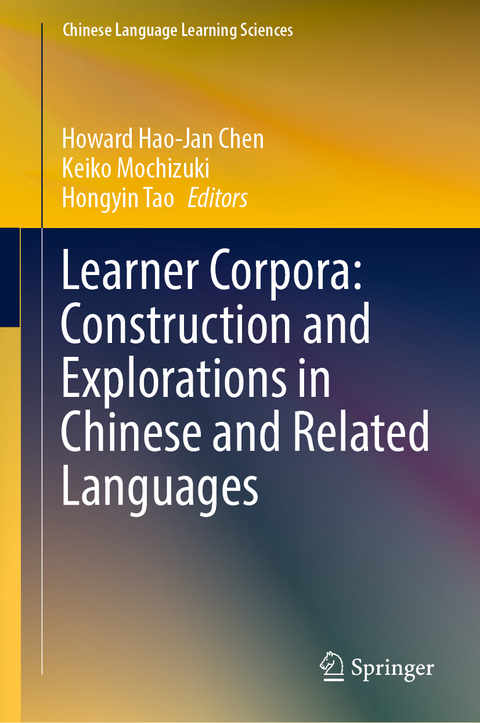
Learner Corpora: Construction and Explorations in Chinese and Related Languages
Springer Verlag, Singapore
978-981-19-5730-7 (ISBN)
Howard Hao-Jan Chen is Professor of Applied Linguistics and former Chair of English Department at the National Taiwan Normal University. His areas of expertise include computer-assisted language learning, corpus linguistics, and applied linguistics. He has also served as Director of Mandarin Training Center of National Taiwan Normal University for four years. He has published numerous journal articles related to computer-assisted language learning and corpus linguistics. He also serves on several editorial boards, including Computer Assisted Language Learning, English Teaching and Learning, and International Journal of Digital Learning Technology. He is also managing the Cool English website, a website for English learning supported by Taiwan Ministry of Education. Keiko Mochizuki is Professor of Applied Linguistics in Graduate School of Global Studies, Tokyo University of Foreign Studies. She specializes in Chinese linguistics, second language acquisition, contrastive linguistics between Japanese, Chinese, and English as well as pedagogy based on learners’ native languages. Her recent works, mostly learner corpus-focussed, have included 1) research on cross-referential learners’ corpora of English, Chinese, and Japanese; 2) an Online Learners’ Composition Corpus and Error Dictionary with the cooperation with researchers in natural language processing; 3) a collaborative project between the Tokyo University of Foreign Studies, National Taiwan Normal University, National Taiwan University, Peking University, Shanghai International Studies University, the University of Leeds, and Akita International University collecting data for an English-Chinese-Japanese Learner Corpus and constructing Learners’ Error Corpora of English/Chinese/Japanese Searching Platform; and 4) International Research on Spoken and Written Corpora of Learners of English, Chinese, and Japanese through University-High School Collaboration. She was Executive Committee Member of International Association of Chinese Linguistics in 2010–2011. Hongyin Tao is Professor of Chinese language and linguistics and applied linguistics at the University of California, Los Angeles. Prior to UCLA, he taught at the National University of Singapore and Cornell University. His areas of expertise include Chinese linguistics, corpus linguistics, sociolinguistics, and applied linguistics. His recent books include Working with Spoken Chinese (2011), Chinese under Globalization (co-edited with Jin Liu, 2011), and Integrating Linguistic Research with Chinese Language Teaching and Learning (2016). His research is supported by the US Department of Education. He was 2014 President of the Chinese Language Teachers Association, USA, is Distinguished Chair Professor at the National Taiwan Normal University, and serves on over twenty editorial boards, including Chinese Language and Discourse, the Heritage Language Journal, and Contemporary Chinese Linguistics.
Part 1.- 1. Introduction.- Part 2. Learner Corpus Construction and Processing.- 2. Building a New Generation Learner Corpus of Chinese.- 3. Some Pragmatic Issues in Learner Corpus: A CSL Perspective.- 4. The Construction of a Learner Error Corpus of Chinese and Its Pedagogical.- 5. A Preliminary Study on Chinese Learner’s Written Errors Based on an Error-Tagged Learner Corpus.- Part 3. Explorations in Learner Corpora.- 6. A Corpus Study of Verb Complement of Manner Constructions in Chinese as a Second Language.- 7. The Acquisition of Relative Clauses in L2 Chinese: A Corpus-Based Study.- 8. Mis-Selection of Near Synonyms: A Study Based on a Written Chinese Corpus.- 9. A Study on the Common V-N Collection Errors Based on Chinese Learner Corpus.- 10. Acquisition of the Chinese Indefinite Determiner “One + Classifier” and English Articles in Two-Way Learner Corpora.- 11. The Acquisition of Aspect in Chinese Based on a Chinese Learner Corpus by English L1 and Japanese L1 Learners.- 12. Referent Tracking and Event Grounding in Oral Narratives of French Learners of Chinese.
| Erscheinungsdatum | 07.04.2023 |
|---|---|
| Reihe/Serie | Chinese Language Learning Sciences |
| Zusatzinfo | 41 Illustrations, color; 342 Illustrations, black and white; VI, 333 p. 383 illus., 41 illus. in color. |
| Verlagsort | Singapore |
| Sprache | englisch |
| Maße | 155 x 235 mm |
| Themenwelt | Schulbuch / Wörterbuch ► Wörterbuch / Fremdsprachen |
| Geisteswissenschaften ► Sprach- / Literaturwissenschaft ► Sprachwissenschaft | |
| Sozialwissenschaften ► Pädagogik ► Schulpädagogik / Grundschule | |
| ISBN-10 | 981-19-5730-4 / 9811957304 |
| ISBN-13 | 978-981-19-5730-7 / 9789811957307 |
| Zustand | Neuware |
| Informationen gemäß Produktsicherheitsverordnung (GPSR) | |
| Haben Sie eine Frage zum Produkt? |
aus dem Bereich


